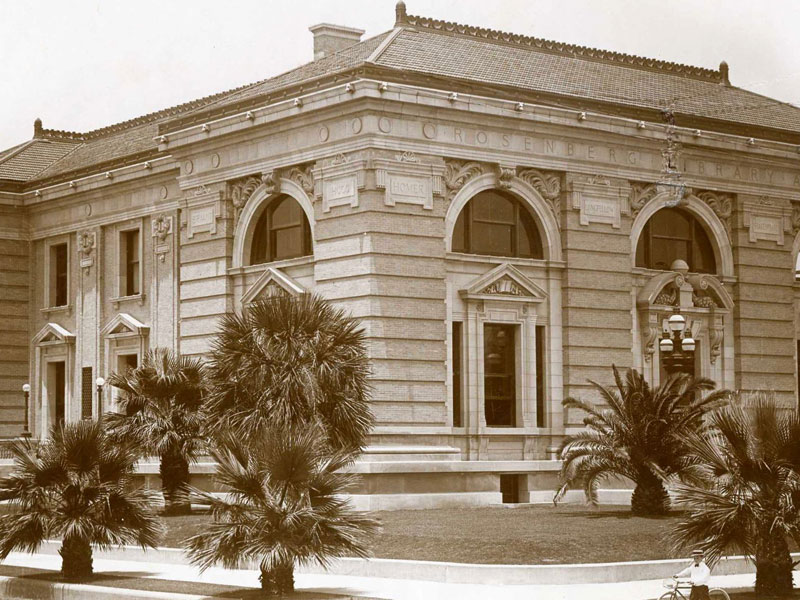The Underrepresentation of African American Women in Early Textile Production
Rosenberg Treasure of the Month: Flying Shuttles
During the month of February, Rosenberg Library will display weaving items that belonged to Eveline, an enslaved woman in the 1860s.

| Shuttles for making cloth used by Eveline, an enslaved woman from Dr. J.W. Lockhart’s plantation C.1861. | Rosenberg Library Museum |
Leading up to the Industrial Revolution, enslaved African American women played a critical role in the development of indigo production. Production of indigo was mainly exported to Britain for their own booming textile industry until 1790 when indigo subsidies collapsed and cotton production started to rise. This came at the cost of enslaved African American women who first began toiling in indigo fields and who then became weavers and spinners. This specialized labor was often reserved for enslaved females due to its domestic features and passed down to future generations. As early as 1745, enslaved women became more valuable for their labor if they were trained to spin and weave. The idea was that the expenses of slavery would be absorbed by the labor of slaves themselves, thereby forcing enslaved women to weave and spin at the attempt to create a self-sustaining slave based economy and textile production.

| Inscribed flying shuttle used by Eveline, and enslaved woman from Dr. J.W. Lockhart’s plantation C.1861. The shuttle that reads, “This shuttle was used by Eveline, the weaver to weave cloth to clothe 75 negro men, women and children slaves of J.W. Lockhart on his plantation near Chappell Hill, Texas during the Civil War, 1861-1865.” | Rosenberg Library Museum |
Flying shuttles looked like an elongated boat often made of dogwood, with an oblong section carved out in the center. The shuttles would contain the weft yarn wound on a bobbin. This shuttle belonging to the Rosenberg Library Museum was donated by the heirs of Dr. J.W. Lockhart and was used by Eveline, an enslaved woman at Lockhart’s plantation in Chappell Hill. There is an inscription on the back of the shuttle that reads, “This shuttle was used by Eveline, the weaver to weave cloth to clothe 75 negro men, women and children slaves of J.W. Lockhart on his plantation near Chappell Hill, Texas during the Civil War, 1861-1865.” Unfortunately, little is known of Eveline or her life enslaved on Lockhart’s plantation. Documentation on the plantation’s enslaved people is scarce. However, it is known that Eveline also served as the handmaiden of Lockhart’s mother.

| With cotton grown and used on the plantation of Dr. J.W. Lockhart, this cotton sock is knitted up to the heel, still attached to the steel knitting needles. It is unknown who knitted this item, c. mid 1800s. | Rosenberg Library Museum |
Although the Industrial Revolution brought improvements and modernization of equipment, weaving and spinning was no easy task. It required attention to detail, sensitivity and delicate interplay of fiber and spindle. It is without a doubt that African American women played a crucial role in the early development of the American textile economy. Much like Eveline’s story, the history of women trained in the craft of weaving is almost all but lost. The plight and hardships that generations of enslaved African American women had to endure should no longer be forgotten or ignored. Their contributions should be acknowledged as the backbone of America’s early economy.
The Treasure of the Month is located on the library’s historic second floor near the East Entrance. It can be viewed during regular library hours, 9:00 a.m. to 5:45 p.m. Monday through Saturday and from 9:00 a.m. – 8:45 p.m. on Tuesdays and Thursdays. For more information, please contact Ivy Albright, Museum Curator at (409) 763 8854 Ext. 125 or at museum@rosenberg-library.org.
We'll Get You Hooked Up!
Luxury Vacation Rentals Available
Rosenberg Library
Rosenberg Library has offered over a century of community service to the Galveston area, and is the oldest public library in Texas in continuous operation. The building itself was dedicated on June 22, 1904, the birthday of its patron, Henry Rosenberg. The Moody Memorial Wing opened in 1971, more than doubling the floor space and allowing for a children’s library, a history center, several galleries to showcase museum collections, and later, a computer lab. The Library accepted its first museum piece shortly after it opened in 1904. Since then, thousands of rare and interesting objects from around the world have been added to the collection. Each month they display a “Treasure of the Month”. Learn more by visiting the Rosenberg Library page and the Gifts of Henry Rosenberg section.






